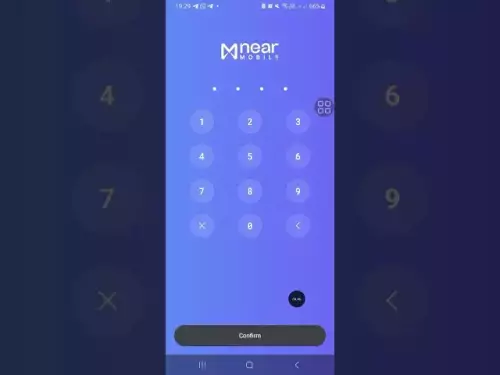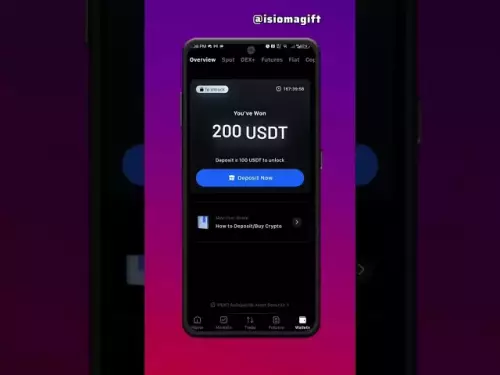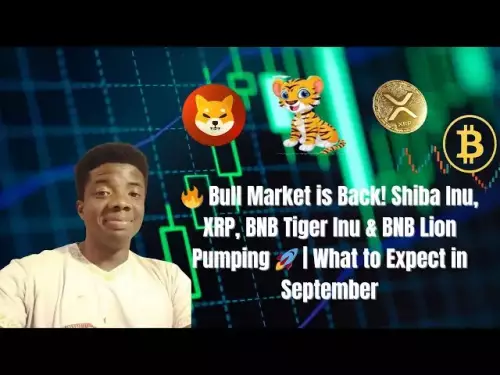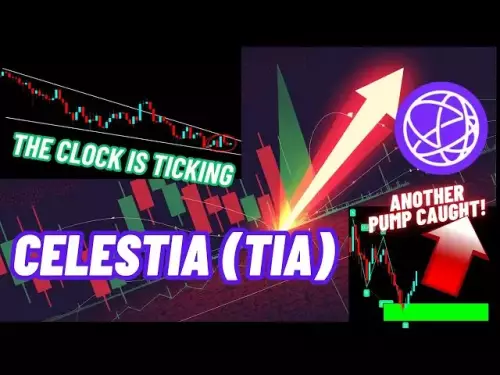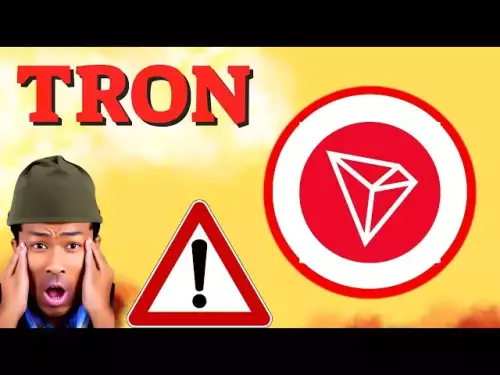-
 Bitcoin
Bitcoin $108100
-0.74% -
 Ethereum
Ethereum $4265
-4.08% -
 Tether USDt
Tether USDt $1.000
0.02% -
 XRP
XRP $2.724
-2.93% -
 BNB
BNB $843.0
-2.55% -
 Solana
Solana $194.5
-4.80% -
 USDC
USDC $1.000
0.01% -
 TRON
TRON $0.3351
-2.30% -
 Dogecoin
Dogecoin $0.2066
-4.58% -
 Cardano
Cardano $0.7887
-4.10% -
 Chainlink
Chainlink $22.21
-5.64% -
 Hyperliquid
Hyperliquid $42.68
-5.20% -
 Ethena USDe
Ethena USDe $1.001
0.02% -
 Sui
Sui $3.139
-4.59% -
 Stellar
Stellar $0.3490
-2.15% -
 Bitcoin Cash
Bitcoin Cash $536.2
-2.15% -
 Avalanche
Avalanche $22.73
-4.38% -
 Hedera
Hedera $0.2123
-4.54% -
 UNUS SED LEO
UNUS SED LEO $9.552
-0.69% -
 Cronos
Cronos $0.2609
-11.91% -
 Litecoin
Litecoin $106.9
-2.81% -
 Toncoin
Toncoin $3.091
-2.76% -
 Shiba Inu
Shiba Inu $0.00001192
-3.18% -
 Polkadot
Polkadot $3.641
-3.82% -
 Uniswap
Uniswap $9.190
-5.54% -
 World Liberty Financial
World Liberty Financial $0.2293
0.29% -
 Dai
Dai $0.0000
0.02% -
 Bitget Token
Bitget Token $4.620
1.40% -
 Monero
Monero $259.7
-1.87% -
 Aave
Aave $301.3
-5.45%
How to fix "insufficient funds for gas" error in Trust Wallet?
You need the native token (like ETH, BNB) in your Trust Wallet to pay gas fees, even when sending other tokens—without it, transactions fail.
Sep 01, 2025 at 08:01 pm
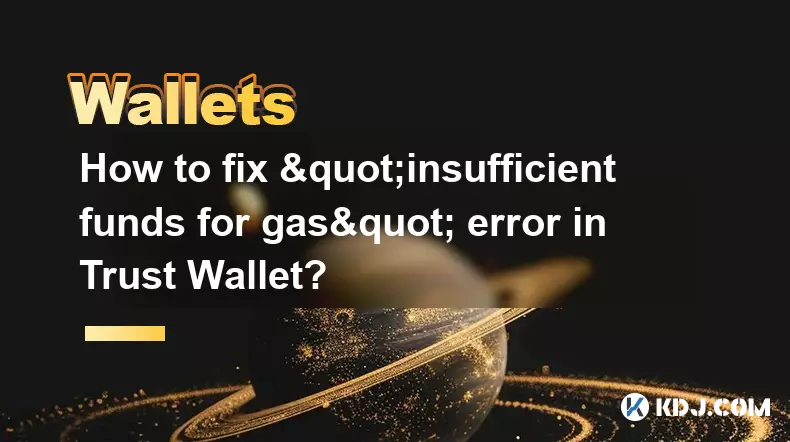
Understanding the 'Insufficient Funds for Gas' Error
1. The 'insufficient funds for gas' error in Trust Wallet typically appears when attempting to send cryptocurrency or interact with a smart contract. This message indicates that the wallet does not hold enough of the native blockchain token to cover transaction fees. For example, on the Ethereum network, users need ETH to pay for gas, even if they are sending another ERC-20 token like USDT or SHIB.
2. Each blockchain operates with its own native token used for gas fees. On Binance Smart Chain (BSC), it’s BNB; on Polygon, it’s MATIC; on Avalanche, it’s AVAX. If you're using Trust Wallet to transact on any of these networks, you must have a small amount of the respective native token in your wallet to initiate any transaction.
3. This error is not related to the balance of the token you're trying to send. Even if your wallet shows a large balance in a specific token, the transaction will fail if the native gas token balance is zero or too low. The blockchain requires gas fees to be paid in the native currency, and Trust Wallet cannot automatically convert other tokens to cover these costs.
4. Some users mistakenly believe that decentralized exchanges or bridges will cover gas fees. In reality, every on-chain action requires the sender to bear the cost. Trust Wallet, being a non-custodial wallet, enforces this rule strictly and will not allow transactions without sufficient gas funds.
5. Another common scenario occurs when users receive tokens on a network but never received the native token. For instance, someone might receive USDC on Ethereum through airdrop or peer transfer but lacks ETH. Without ETH, they cannot send that USDC, leading to confusion and repeated failed transaction attempts.
Steps to Resolve the Gas Fee Issue
1. Identify which blockchain network your transaction is being sent on. Open Trust Wallet, go to the wallet tab, and check the token you're trying to transfer. Tap on it to view details, including the network it belongs to. This information is crucial for knowing which gas token you need.
2. Acquire a small amount of the required native token. For Ethereum, purchase or receive ETH; for BSC, get BNB. Even $1 to $5 worth is usually sufficient for several transactions. You can buy these directly within Trust Wallet using the 'Buy' feature if available in your region.
3. Transfer the native token to your Trust Wallet address on the correct network. Ensure you're sending it to the same wallet address used in Trust Wallet and confirm the network compatibility. Sending BNB on the Ethereum network instead of BSC will result in lost funds.
4. After depositing the native token, wait for the transaction to confirm. Refresh your Trust Wallet balance if necessary. Once the gas token appears in your wallet, retry the original transaction. The gas fee will be deducted automatically from the native token balance.
5. Always keep a small reserve of the native token for future transactions. This proactive step prevents recurring gas errors, especially if you frequently interact with DeFi platforms, NFT marketplaces, or cross-chain bridges.
Common Misconceptions and Pitfalls
1. Some users assume that gas fees can be paid using the same token they are transferring. This is false. Blockchains do not allow fee payments in arbitrary tokens. The network's consensus rules require fees in the native asset, and Trust Wallet adheres strictly to these protocols.
2. Another misconception is that using a hardware wallet or connecting to a dApp via WalletConnect bypasses gas requirements. These tools still rely on the underlying blockchain rules. If the connected wallet lacks gas tokens, the transaction will fail regardless of the interface used.
3. Users sometimes attempt to send tokens from exchanges directly to Trust Wallet without including gas tokens. Exchanges often only send the requested token, leaving the receiving wallet without gas. It’s the user’s responsibility to ensure the wallet has native tokens after such transfers.
4. Using the wrong network for deposits is a frequent cause of inaccessible funds. For example, depositing ERC-20 USDT to a Trust Wallet address via the TRON network will not credit the balance. Always match the deposit network with the token standard.
5. Trust Wallet does not charge additional fees beyond what the blockchain network requires. The displayed gas fee is determined by network congestion and transaction complexity, not by the wallet application itself.
Frequently Asked Questions
Why do I need ETH to send a different token on Ethereum?Ethereum requires all transactions to pay gas fees in ETH. This includes transfers of ERC-20 tokens like USDT or DAI. The network uses ETH to compensate miners or validators for processing and securing transactions.
Can I use one token to pay gas for another blockchain?No. Each blockchain requires its native token for gas. You cannot use ETH to pay BSC gas fees or MATIC to pay Ethereum fees. Cross-chain gas payments are not supported by current blockchain architectures.
What happens if I try to send a transaction without enough gas?The transaction will fail and remain pending or be rejected immediately. The network will not process it, and any gas already spent may be partially lost if the transaction was broadcasted before failing.
Is there a way to estimate gas fees before sending?Yes. Trust Wallet displays the estimated gas fee before confirming a transaction. Third-party tools like Etherscan or BscScan also provide real-time gas price recommendations based on network conditions.
Disclaimer:info@kdj.com
The information provided is not trading advice. kdj.com does not assume any responsibility for any investments made based on the information provided in this article. Cryptocurrencies are highly volatile and it is highly recommended that you invest with caution after thorough research!
If you believe that the content used on this website infringes your copyright, please contact us immediately (info@kdj.com) and we will delete it promptly.
- Memecoins September 2025 Watchlist: What's Hot Now?
- 2025-08-31 23:25:15
- Eric Trump Predicts Bitcoin to $1 Million: Hype or Reality?
- 2025-08-31 23:25:15
- BlockDAG: Redefining Scalability and ROI Potential in 2025
- 2025-08-31 23:05:16
- Ozak AI, Altcoins, and 20x Potential: Navigating the Crypto Landscape
- 2025-09-01 00:05:12
- Bonk Price, Solana Meme Coin, and the Rise of Layer Brett: A New Era?
- 2025-08-31 21:25:12
- ETH Transactions Soar, BTC Whale Shifts Gears: Decoding August's Crypto Charts
- 2025-08-31 21:05:16
Related knowledge
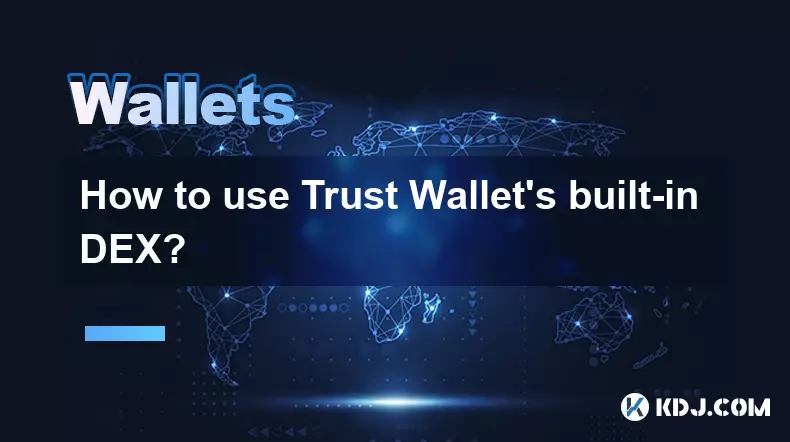
How to use Trust Wallet's built-in DEX?
Aug 29,2025 at 07:28am
Understanding Trust Wallet’s Built-in DEX1. Trust Wallet integrates a decentralized exchange (DEX) directly within its mobile application, allowing us...
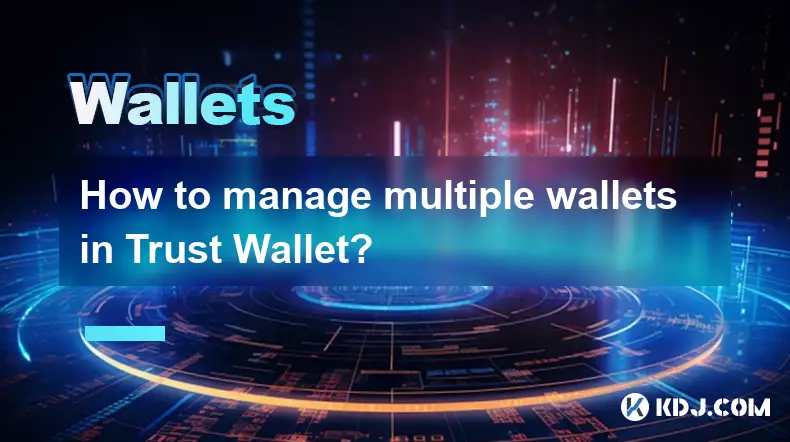
How to manage multiple wallets in Trust Wallet?
Aug 30,2025 at 04:45am
Understanding Wallet Management in Trust Wallet1. Trust Wallet supports a wide range of cryptocurrencies and tokens, allowing users to manage multiple...
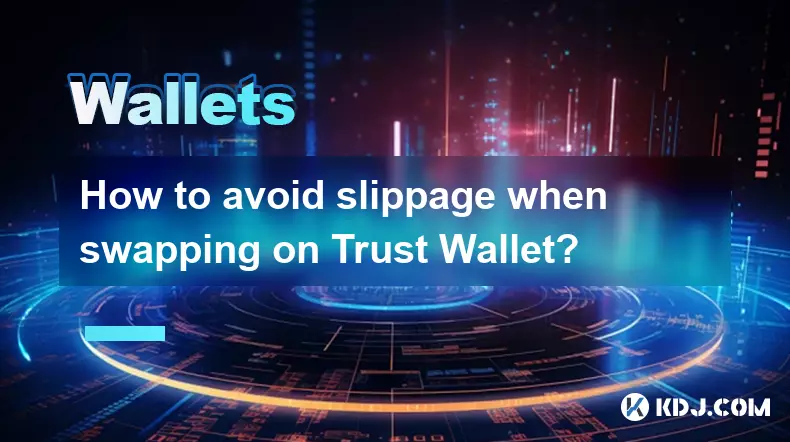
How to avoid slippage when swapping on Trust Wallet?
Aug 29,2025 at 03:01am
Understanding Slippage in Decentralized Exchanges1. Slippage occurs when the price of a cryptocurrency changes between the time a transaction is initi...
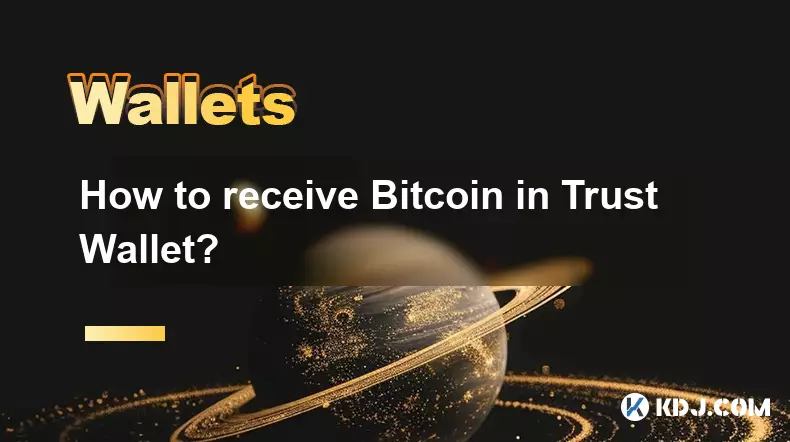
How to receive Bitcoin in Trust Wallet?
Aug 31,2025 at 08:36pm
Understanding Bitcoin Reception in Trust Wallet1. Trust Wallet supports Bitcoin (BTC) as one of its core cryptocurrencies. To receive Bitcoin, users m...
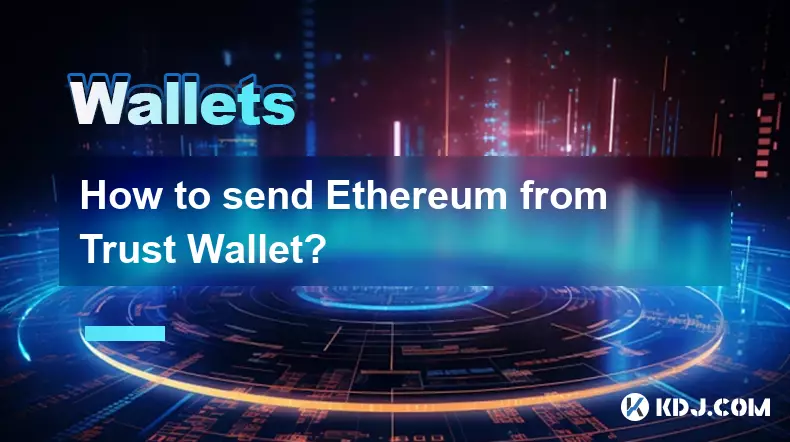
How to send Ethereum from Trust Wallet?
Sep 01,2025 at 01:55pm
Sending Ethereum from Trust Wallet: A Step-by-Step GuideTrust Wallet is one of the most widely used cryptocurrency wallets, especially for users who p...
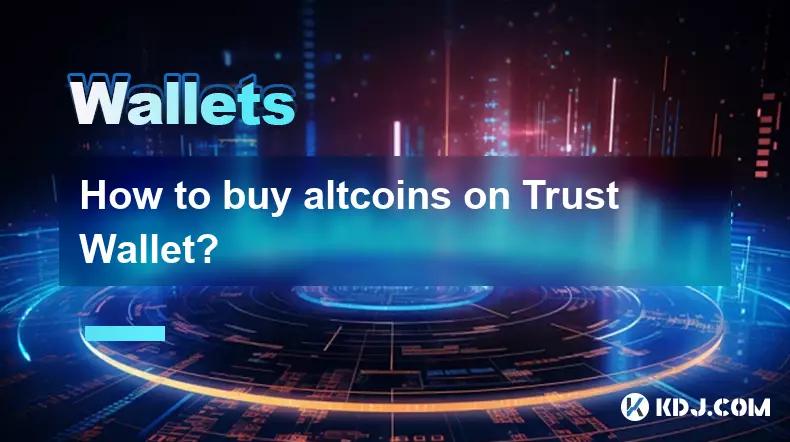
How to buy altcoins on Trust Wallet?
Aug 29,2025 at 11:36pm
Understanding Trust Wallet and Altcoin Purchases1. Trust Wallet is a non-custodial cryptocurrency wallet that supports a wide range of altcoins and bl...

How to use Trust Wallet's built-in DEX?
Aug 29,2025 at 07:28am
Understanding Trust Wallet’s Built-in DEX1. Trust Wallet integrates a decentralized exchange (DEX) directly within its mobile application, allowing us...

How to manage multiple wallets in Trust Wallet?
Aug 30,2025 at 04:45am
Understanding Wallet Management in Trust Wallet1. Trust Wallet supports a wide range of cryptocurrencies and tokens, allowing users to manage multiple...

How to avoid slippage when swapping on Trust Wallet?
Aug 29,2025 at 03:01am
Understanding Slippage in Decentralized Exchanges1. Slippage occurs when the price of a cryptocurrency changes between the time a transaction is initi...

How to receive Bitcoin in Trust Wallet?
Aug 31,2025 at 08:36pm
Understanding Bitcoin Reception in Trust Wallet1. Trust Wallet supports Bitcoin (BTC) as one of its core cryptocurrencies. To receive Bitcoin, users m...

How to send Ethereum from Trust Wallet?
Sep 01,2025 at 01:55pm
Sending Ethereum from Trust Wallet: A Step-by-Step GuideTrust Wallet is one of the most widely used cryptocurrency wallets, especially for users who p...

How to buy altcoins on Trust Wallet?
Aug 29,2025 at 11:36pm
Understanding Trust Wallet and Altcoin Purchases1. Trust Wallet is a non-custodial cryptocurrency wallet that supports a wide range of altcoins and bl...
See all articles





















